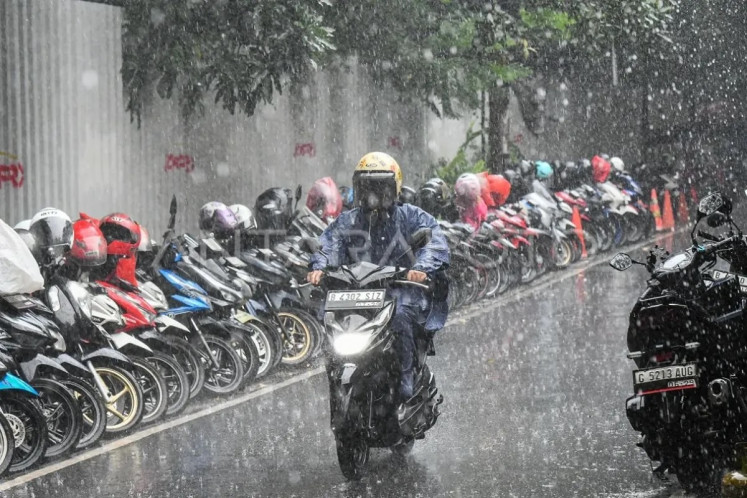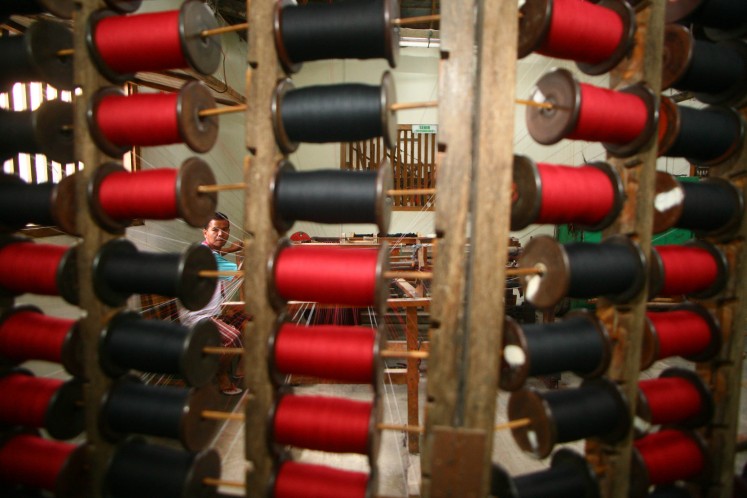Popular Reads
Top Results
Can't find what you're looking for?
View all search resultsPopular Reads
Top Results
Can't find what you're looking for?
View all search resultsModern-day slavery commonplace on fishing vessels
Fishermen show off their big catch on a ship
Change text size
Gift Premium Articles
to Anyone
![Fishermen show off their big catch on a ship. (Courtesy of ILSM)" border="0" height="333" width="500"><span class="caption" style="width: 498px;">Fishermen show off their big catch on a ship. (Courtesy of ILSM)</span></span></p><p>Singapore has one of the worldâs busiest airports, at which thousands of sailors arrive and leave the island city-state every day.</p><p>Many of these are young Indonesians who work on the sea, some of whom have enough skills to meet international seamen qualifications. But others fail to meet even the minimum skill requirements.<br><br>Christian Schmidt, a port chaplain from the International Lutheran Seafarersâ Mission (ILSM), knows a great deal about the visiting seamen -- many of whom are abandoned by their employers -- as he deals with them on an almost daily basis. In some cases, they do not receive their salaries despite having worked for months or even several years when ship owners secretly sell their vessels and desert their employees at the sea port. The sailorsâ passports are not returned so they cannot not return to their home countries or enter the city.<br><br>âWe are often shocked to see the living and working conditions of the fishermen,â Schmidt said during a recent conversation with The Jakarta Post at Bedok Lutheran Church after delivering his Sunday sermon. In his sermon, he called on churchgoers to donate to the mission to help the seafarers.<br><br>âFishermen are often the most unfortunate compared to other workers [from] other ships like tankers,â said Schmidt, who has worked for the church and also for the ILSM for years.<br><br>The humanitarian activist cited a 15-point document on ship rules and regulations originally issued by a Taiwan-based company, which is full of penalties that workers may have to pay to the company -- often much higher figures than what they receive for their salaries.<br><br>For instance, fishermen could be fined US$100 if they sleep while on duty, and the fine is doubled if they are found sleeping for a second time.<br><br>âThis is modern slavery. This is ridiculous,â said Schmidt. </p><p><span class="inline inline-none"><img class="image image-_original " src="http://202.158.21.182/files/images2/sp06-ggPort-chaplain.jpg" alt="Port chaplain from the International Lutheran Seafarersâ Mission (ILSM), Rev. Christian Schmidt (center, white shirt) visits fishermen at a Singapore port. (Courtesy of ILSM)" title="Port chaplain from the International Lutheran Seafarersâ Mission (ILSM), Rev. Christian Schmidt (center, white shirt) visits fishermen at a Singapore port. (Courtesy of ILSM)](https://www.thejakartapost.com/files/images2/sp06-ffFishermen-.jpg) Fishermen show off their big catch on a ship. (Courtesy of ILSM)" border="0" height="333" width="500">Fishermen show off their big catch on a ship. (Courtesy of ILSM)
Fishermen show off their big catch on a ship. (Courtesy of ILSM)" border="0" height="333" width="500">Fishermen show off their big catch on a ship. (Courtesy of ILSM)Singapore has one of the worldâs busiest airports, at which thousands of sailors arrive and leave the island city-state every day.
Many of these are young Indonesians who work on the sea, some of whom have enough skills to meet international seamen qualifications. But others fail to meet even the minimum skill requirements.
Christian Schmidt, a port chaplain from the International Lutheran Seafarersâ Mission (ILSM), knows a great deal about the visiting seamen -- many of whom are abandoned by their employers -- as he deals with them on an almost daily basis. In some cases, they do not receive their salaries despite having worked for months or even several years when ship owners secretly sell their vessels and desert their employees at the sea port. The sailorsâ passports are not returned so they cannot not return to their home countries or enter the city.
âWe are often shocked to see the living and working conditions of the fishermen,â Schmidt said during a recent conversation with The Jakarta Post at Bedok Lutheran Church after delivering his Sunday sermon. In his sermon, he called on churchgoers to donate to the mission to help the seafarers.
âFishermen are often the most unfortunate compared to other workers [from] other ships like tankers,â said Schmidt, who has worked for the church and also for the ILSM for years.
The humanitarian activist cited a 15-point document on ship rules and regulations originally issued by a Taiwan-based company, which is full of penalties that workers may have to pay to the company -- often much higher figures than what they receive for their salaries.
For instance, fishermen could be fined US$100 if they sleep while on duty, and the fine is doubled if they are found sleeping for a second time.
âThis is modern slavery. This is ridiculous,â said Schmidt.
 Fishermen show off their big catch on a ship. (Courtesy of ILSM)<)
Fishermen show off their big catch on a ship. (Courtesy of ILSM)<)
Fishermen show off their big catch on a ship. (Courtesy of ILSM)
Singapore has one of the world's busiest airports, at which thousands of sailors arrive and leave the island city-state every day.
Many of these are young Indonesians who work on the sea, some of whom have enough skills to meet international seamen qualifications. But others fail to meet even the minimum skill requirements.
Christian Schmidt, a port chaplain from the International Lutheran Seafarers' Mission (ILSM), knows a great deal about the visiting seamen -- many of whom are abandoned by their employers -- as he deals with them on an almost daily basis. In some cases, they do not receive their salaries despite having worked for months or even several years when ship owners secretly sell their vessels and desert their employees at the sea port. The sailors' passports are not returned so they cannot not return to their home countries or enter the city.
'We are often shocked to see the living and working conditions of the fishermen,' Schmidt said during a recent conversation with The Jakarta Post at Bedok Lutheran Church after delivering his Sunday sermon. In his sermon, he called on churchgoers to donate to the mission to help the seafarers.
'Fishermen are often the most unfortunate compared to other workers [from] other ships like tankers,' said Schmidt, who has worked for the church and also for the ILSM for years.
The humanitarian activist cited a 15-point document on ship rules and regulations originally issued by a Taiwan-based company, which is full of penalties that workers may have to pay to the company -- often much higher figures than what they receive for their salaries.
For instance, fishermen could be fined US$100 if they sleep while on duty, and the fine is doubled if they are found sleeping for a second time.
'This is modern slavery. This is ridiculous,' said Schmidt.
Port chaplain from the International Lutheran Seafarers' Mission (ILSM), Rev. Christian Schmidt (center, white shirt) visits fishermen at a Singapore port. (Courtesy of ILSM)
Schmidt and his friends organize humanitarian assistance for visiting or stranded sailors. They provide free meals, SIM cards and health services for the men. Schmidt is currently dealing with the crew members of a fishing boat who lost everything, including their wages, because their master fled after selling his vessel. They were also left without food or other supplies. Furthermore, the sailors had to face months of harsh living conditions on their ship and at the port.
'Sometimes we even have to provide money for them to send to their families while they are fighting for their rights,' said the pastor.
Citing an official document from his organization, Schmidt said that fishermen are often away at sea for months or even up to three years at a time with only very brief periods of free time on dry land. 'It often happens that a ship remains at sea for two years. Its fuel and other logistical needs are supplied by other ships. The ship does not need to return to port to sell its catches because buyers come [to it] to buy the fish,' he said.
Schmidt emphasized that his church provides services to all needy people regardless of their religion.
'Regardless of their nationality, race, rank or religion, we offer a helping hand to seafarers who enter ports of Singapore,' he said.
Singapore authorities granted permission for The Jakarta Post to visit a seamen's center, but the permit was only issued the day after the Post left the city.
Singapore has provided better treatment for foreign seafarers since the maritime labor convention (MLC2006) came into force in August 2006. The convention provides clear and strong rules on abandonment, one of the most serious problems in the industry.
'According to the convention, the flag state [of the ship] is responsible for sending seafarers home when their ship is abandoned, if a ship owner fails to fulfill their obligation,' said the pastor.
'The fate of Indonesian fishermen who are working on foreign vessels is often just like the fate of many of our female domestic workers in foreign countries,' said Lambayong, an Indonesian seaman who worked for several years for a Taiwanese fishing vessel before moving to a better working conditions on a merchant vessel.

Lambayong said many Indonesian seafarers become victims of human trafficking after being cheated by illegal brokers in their home provinces. Many of them are uneducated and unskilled men who are lured by high salaries and other benefits. In many cases, such promises are not fulfilled by employers.
Fusako Go, the Jakarta-based correspondent of Asahi Shimbun, wrote last year that the Japanese fishing industry offers huge opportunities for young Indonesians. Japanese companies are said to be especially interested in recruiting graduates of the Tegal Public Fishery School in Central Java. The school offers a Japanese language course for its third-year students.
Japan introduced a training program for foreign workers in 1993. The foreigners are assigned to work in small industries, including fisheries. After working for a few years, they are expected to have acquired enough skills to open their own businesses in Indonesia.
The program, however, is often criticized as being a method of sourcing cheap labor from poorer Asian countries because Japan is facing a severe shortage of unskilled workers.
'Despite the safety risks, many Indonesians view the program as an opportunity to learn advanced fishing techniques and to earn a good wage,' Go wrote.









